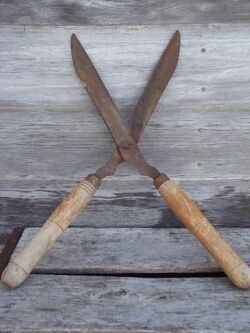| Algernon Swinburne's Garden Shears | |
|---|---|

| |
| "Here life has death for neighbour" The Garden of Proserpine | |
|
Origin |
Algernon Swinburne |
|
Type |
Garden Shears |
|
Effects |
Cuts a person off from reality |
|
Downsides |
Entering a state of total non-existence |
|
Activation |
Thinking of and snipping directly at a targeted person |
|
Collected by |
Warehouse 12 |
|
Section |
|
|
Date of Collection |
May 2, 1907 |
| [Source] | |
Origin[]
Algernon Charles Swinburne (5 April 1837 – 10 April 1909) was an English poet, playwright, novelist, and critic. He wrote several novels and collections of poetry such as Poems and Ballads, and contributed to the famous Eleventh Edition of the Encyclopedia Britannica. All critics praised him for his rhyme and meter skills, but not the word choices which failed at times to connect to a poem's meaning.
His works and life were often pointed towards taboo subjects. He was a an alcoholic, erotic masochist who liked flogging, energetic to the point of recklessness and rumored to have fancied Sir Richard Francis Burton (even though he hated travel). In fact, he suffered a bout of dysentery in 1879 and had to be nursed back by his friend Theodore Watts-Dunton. For 30 years Swinburne resided in one of Watts' homes and continued writing to a more tempered tone. Many fellow authors felt Watts saved the man himself but killed the bombastic poet with his kindness.
The Garden of Proserpine[]
In response to the growing Crisis of Faith during Victorian times, many debated what if anything happens in the afterlife. As part of Poems and Ballads, Swinburne emphasized Proserpine's (Persephone in Greek) relation to death and sleep as the wife of Hades. Proserpine was goddess of eternal death, forced to continue living on as her role required. Instead of any sort of salvation or damnation, there was eternal nothingness. No pearly gates, no reincarnation, no Valhalla. Only an infinite ending.
Swinburne challenged that her embrace into oblivion was neither good or bad, but just finality to be accepted. His choice of metaphors and diction were additional tools to further compare the crisis of Christianity to the decline of the pagan pantheons. They also furthered his general pessimism and dissatisfaction with religion.
Effects[]
Touching it will prime the shears. Using recklessly will immediately affect the user, but snipping directly at a person while concentrating will affect them instead. Removes a person from reality completely. This will fully remove a person's existence from history, filling any gaps of their presence with moments of monotony and tranquility for others.
The person can be directly restored if the shears are rested upon Theodore Watts-Dunton's Couch, who helped revive both Swinburne's motivation to life and career when needed most. Doing so will bring back the last person erased and can be repeated until nobody returns, at which point the historical record has been reverted.
